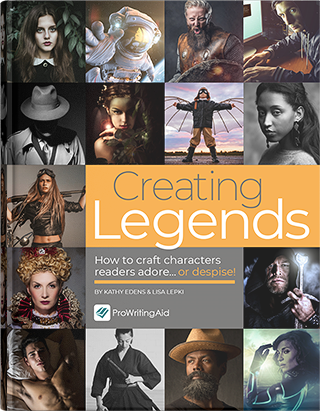
Authors often ask, “What is voice?” It’s a concept even the most gifted writers and teachers struggle to define. The simplest definition I can offer is that an author’s voice is their honest and distinctive self-expression. Vague? Airy-fairy? Maybe, but hang with me. Then you decide.
“Voice” encompasses two aspects:
1. What you have to say, which is a culmination of your experiences, values, and passions expressed through your unique perspective.
2. How you say it, which includes style, tone, and effective use of craft revealed through your technique
The second aspect, which leans toward the mechanics of writing, is largely learned. The first is exclusively yours.
In Steering the Craft: A 21st Century Guide to Sailing the Sea of Story, Ursula LeGuin says, "Often voice is a kind of shorthand for authenticity (writing in your own voice, catching the true voice of a person, and so on).” She goes on to explain that she uses the term in her book to mean the voice of the character telling the story, the narrating voice.
So the concept of “voice” is doubly complicated for fiction writers because our characters have their own voices too. Yikes!
To clarify what “voice” is let’s first tease out the author’s voice from the characters’ voices. Then we’ll look at six actions you can take to develop your unique writing voice.
Authorial Voice vs. Characters’ Voices
Your writing voice is a blended soup of your unique perspective on every aspect of life, along with the mechanics of your writing and the attitude that comes through in it. Your background and experiences, your subject matter, your word choices, even the punctuation you use contribute to your authorial voice and reveal your unique outlook and personality.
The authorial voice of a non-fiction writer is typically more upfront to readers and more apparent all the way through a piece of writing than a fiction author’s voice is. The non-fiction writer has more latitude to put their personality on the page. Readers of fiction, however, have more interest in the characters—their world and their perspectives—than in the author; the characters’ voices are forefront.
Elizabeth George explains in Write Away that the narrative “voice” of a novel is the point-of-view character’s “defining way of speaking and thinking, the tone that comes through the narrative itself when that POV character is on stage.” She adds that the POV character’s voice is not the author’s voice unless the author is the character; that is, the POV character’s voice is not the author’s way of speaking and thinking.
In short, your main character’s voice shouldn’t sound like yours unless you’re intentionally writing yourself as that character. You will develop your main character’s voice through character analysis: his background, belief system, education, prejudices, desires, position, his/her tone and attitude. All these aspects of your character’s “life” are different than your own. Thus, the story should illustrate and illuminate these for the reader through the character’s voice, not yours.
If readers are more interested in the characters’ voices than the author’s, why then should a fiction writer be concerned with developing their true authorial voice?
The answer lies in the first aspect of voice noted above, what you have to say, more than in the second, learned aspect of how you say it; the themes and issues your fiction explores will come from a perspective unlike any other writer’s—one only you can provide.
Those themes and issues might not be obvious to you yet, but they’re there in your subconscious. The more you write, the more they will reveal themselves. Here are six steps you can take to boost the development of your true writing voice.
1. Be Willing to Practice and Experiment
Every creative person goes through a period of looking toward the work of others to see what can be learned. As a reader, you’ll naturally gravitate toward writers whose values and messages resonate with you. As you seek out your own uniqueness in what you have to say you’ll inevitably find yourself emulating those individuals. And that’s okay!
Furthermore, I encourage you to purposefully experiment with techniques other writers use. Explore the different ways your favorite authors develop their characters or approach the topics or themes they write about.
“But that sounds like copying!” you say. “I can’t steal someone else’s work!”
Of course you can’t. And you aren’t. You’re practicing. This is muscle-building. Imitating the masters is an accepted and expected learning method in other art forms. Why not writing, too?
Practice, experimentation, and emulation are easy and safe methods for finding your writer’s voice. In your practice writing, you can say whatever you want in whatever way you want. You can explore topics or themes, play with tone, style, and perspective.
I’ll warn you though. After a while, practice and imitation will begin to feel unsatisfying, disingenuous, or inauthentic. That’s a GREAT thing. It means you’re starting to develop your own voice.
2. Know You Won’t Like Everything You Write
Naturally, while practicing and experimenting, you’re going to put out some crap. Get used to it and be kind to yourself about it. It’s a natural part of the process.

Even with the crap—because of it, actually—you’re another step closer to writing in your own true voice. As you move away from your mentors, teachers, and others who have influenced you, you’ll realize your own voice is showing up more often. All the knowledge, language, and experience you’ve been gathering are becoming blended into a one-of-a-kind cocktail that is uniquely you.
3. Ask Yourself These Four Questions
- What are you passionate about or what makes you tremendously curious?
- What keeps you up at night; what are you most afraid of?
- What makes you angry?
- What makes you cry?
If you’re a beginner, these questions can help you start to examine issues that are important to you. Even if you have only a small body of work, there’s a good chance your answers are showing up in your work already. If they’re important to you, you can bet they’ll resonate with others.
What would it look like then for these to show up through a character in one of your stories? Or could what you have to say about these issues make for a piece of non-fiction?
4. Find Stillness to Listen for Your True Voice
Some writers talk about requiring quiet to write, but “stillness” doesn’t refer to silence in your environment; though quiet can enhance stillness. Stillness is an inner quiet—in the mind and body—that allows us to hear what’s in our hearts and minds, and what’s urging us, from inside ourselves, to write. Finding stillness to listen to your inner guidance is perhaps the most important but least obvious action you can take toward developing your writer’s voice.
Inner stillness can be difficult to accomplish in our normally busy lives, where external noise is relentless. The best way I’ve found to create this stillness is by walking. Besides the physicality of putting one foot in front of the other, walking causes a beneficial shift in what’s going on inside my head.
At first, my focus turns from the unhelpful, busy chatter inside my brain toward what’s outside of me. Allowing myself to simply be in that moment with whatever is around me clears my mind of external influences. Once that stillness settles over me, THEN I can return inward to listen to my own heart.

Walking makes me a better observer, thus, a better writer. But, more importantly, walking reconnects me to my inner voice.
In whatever way you can find stillness for yourself, creating it in your mind and body will allow you to “hear” the stories that are yours to tell—whether they’re personal stories or ones filled with fictional characters. And, importantly, they will allow you to hear your responses to the questions I posed for you above.
5. Don’t Equivocate
In If You Want to Write: A Book About Art, Independence, and Spirit, Brenda Ueland said:
“Though everybody is talented and original, often it does not break through for a long time. People are too scared, too self-conscious, too proud, too shy. They have been taught too many things about construction, plot, unity, mass, and coherence.”
I would add to Ueland’s quote that our talents and originality came along with a unique voice at birth. But as children and sometimes into adulthood, we’re taught our perspective is not useful or valid. We’re taught to be as Ueland describes: scared, self-conscious, proud, or shy.
Additionally, we’re given specific “rules” to follow when we’re attempting to express ourselves. In an effort to fit in and to obey those rules, we modify or shrink our authentic self-expression until we no longer “sound” like our true selves.
Writing, of course, has rules and logic and structure. But learning the rules does much less to improve your writing than finding the will and the guts to put on paper what you really want to say. If you’re ever to claim the voice that’s uniquely your own, you must not equivocate. You must not evade difficult topics, compromise your values and beliefs, devalue your thoughts and opinions, or diminish your perspective. Because what you have to say is important.
6. Focus on Your Author Voice with ProWritingAid
I know what you're thinking: "Won't a writing app make me sound generic and close off my authentic voice?" I thought it too. But having used ProWritingAid, I've actually found that it has the opposite effect.

The editor automatically suggests thousands of style improvements, which helps you get your ideas out faster. Instead of spending time searching around for the perfect word, a list of suitable options pops up that are based on the context of your writing. I also run the Readability Report on all of my writing to help me write as clearly as possible. It helps me find repeated words and passive voice so that what I want to say doesn't get lost. That said, you can ignore suggestions the app makes. If you think that line needs to be in passive voice, you keep it that way!
Investing in a writing tool can help you focus more of your time on building your authentic voice using the steps above.
Get Writing and Find Your Author Voice!
Your true writer’s voice matters. There is nothing idealistic or ambiguous about that. It will reveal itself fully through the repetitive act of writing—honest, messy, and unrestrained. So get writing!


